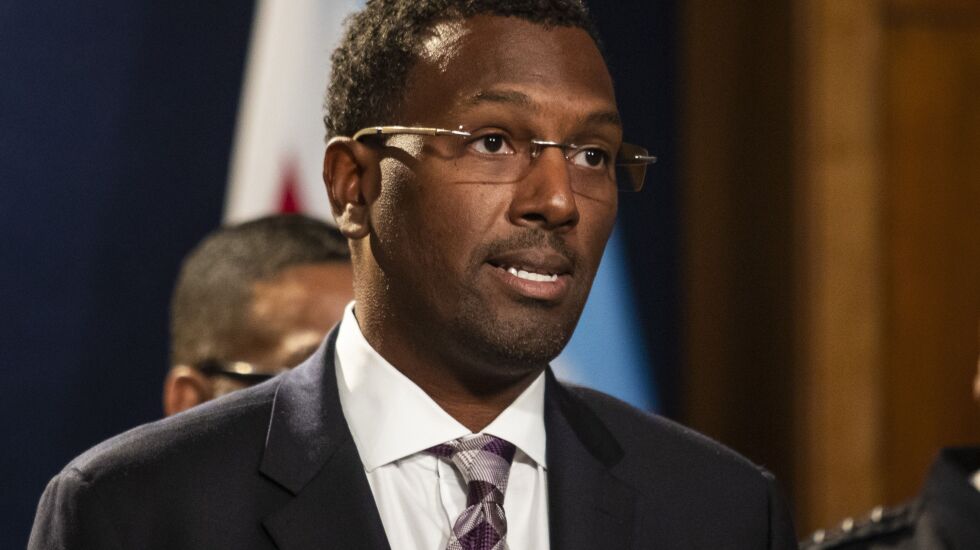
The outgoing president of the Chicago Police Board urged the City Council on Tuesday to reject an independent arbitrator’s ruling that he claimed would undermine police reform by stripping the board of its most powerful tool.
The August ruling would allow Chicago police officers accused of the most serious wrongdoing and recommended for firings or suspensions longer than a year to bypass the board and take their cases to an independent arbitrator, who might be more sympathetic to their arguments and would hold proceedings on those cases behind closed doors.
The ruling must be ratified by the City Council.
Outgoing Police Board President Ghian Foreman’s remarks to the Council at a budget hearing Tuesday were his last public chance to make a case to alderpeople to preserve the status quo. He has led the board for 13 years.
“Police accountability, and ultimately the people of Chicago, will suffer if the most serious disciplinary cases are removed from the Police Board’s jurisdiction and placed in the hands of an independent arbitrator,” Foreman said.
“We’re trying to create this system where the public doesn’t see the police as opposition,” Foreman said. “From sitting in this neutral position that we have to sit in, that’s in contrast to me to put it back behind closed doors.”
Foreman cited as an example the complaint he filed with the Civilian Office of Police Accountability accusing a Chicago police officer of striking him with a baton during a 2020 protest sparked by the police killing of George Floyd.
COPA recommended a three-month suspension after concluding that Officer Zachary Girard struck Foreman “without justification” and failed to document his use of force.
“It took a long time. So, you’re wondering what happened? I kind of forgot about it a little bit until people asked me about it. And then it went to arbitration. I still don’t know what happened,” Foreman said.
“Just from an everyday person perspective, it just kind of doesn’t seem fair that the police have a different set of rules. If I hit the police officer, you guys are gonna know what happened to me pretty much right away.
“And so, I think this would be a big mistake — not just for you guys to vote for this, but for the police to say, ‘This is what we want.’ I don’t think it advances our city,” he said.
Far North Side Ald. Maria Hadden (49th) said the arbitrator’s ruling “feels like a backslide to me” because it will lead to “less transparency and less accountability.”
She asked Foreman why the issue was raised now, at a time when Chicago needs to restore shattered trust between citizens and police, particularly in Black and Brown communities.
“If I’m negotiating a contract, I’m putting everything out there … and I’m trying to get the most that I can get in any negotiation,” Foreman said.
“This is not just a Chicago issue. This is something that’s taking place around the country. There’s a lot more civilian oversight happening around the country,” Foreman said. “And the FOP is looking after their members and saying, ‘Wait a minute. Everybody else gets to go to arbitration. I want to go to arbitration, too.’”
Over the last five years, there have been 103 cases filed with the Police Board where the recommended punishment was termination, with 92 of those cases involving Fraternal Order of Police members.
“Our expectation would be that very few, if any of those cases would come to the Police Board if this change takes effect,” said Max Caproni, the Police Board’s executive director.
Ten years ago, FOP members won the right to choose between the Police Board and arbitration for suspensions ranging between 31 and 365 days.
“We’ve had exactly one case come to the Police Board in about the last 10 years. That shows what the decisions likely would be,” Caproni said.
FOP President John Catanzara could not be reached for comment on Foreman’s appeal to the City Council.
After the August ruling, Catanzara called it a “huge victory” for rank-and-file officers. He argued that COPA has proven to be “extremely biased and one-sided, especially with the more notable cases, and they just can’t wait to get the pitchfork and torch out, along with the rest of the mob out there.”
During a separate appearance at Tuesday’s budget hearing, city Inspector General Deborah Witzburg used two words to describe how successful the police department has been in complying with a consent decree outlining the terms of federal court oversight of the department.
“Not very,” she said.
“Reform happens on the street — not on the paper,” Witzburg said. “It is that third step which matters to Chicagoans in uniform and out. And with respect to that level of compliance, the city is in single-digit percentages.”







